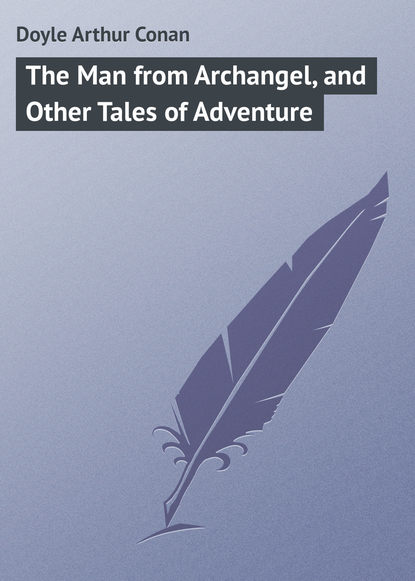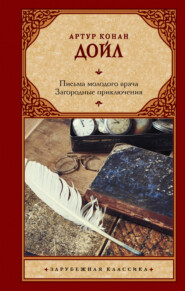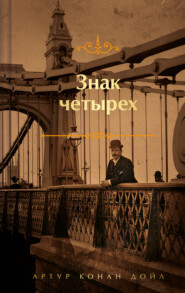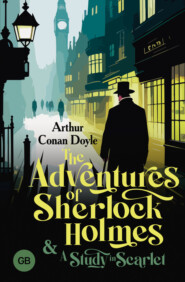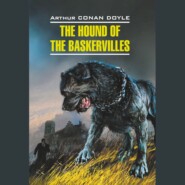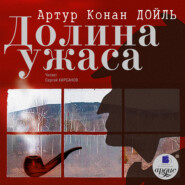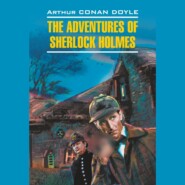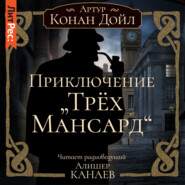По всем вопросам обращайтесь на: info@litportal.ru
(©) 2003-2024.
✖
The Man from Archangel, and Other Tales of Adventure
Настройки чтения
Размер шрифта
Высота строк
Поля
"It's always well to bring one in your waistcoat pocket," said he with a chuckle, "but I suppose you youngsters are above all that."
We made him President of our Branch of the British Medical Association, but he resigned after the first meeting. "The young men are too much for me," he said. "I don't understand what they are talking about." Yet his patients do very well. He has the healing touch – that magnetic thing which defies explanation or analysis, but which is a very evident fact none the less. His mere presence leaves the patient with more hopefulness and vitality. The sight of disease affects him as dust does a careful housewife. It makes him angry and impatient. "Tut, tut, this will never do!" he cries, as he takes over a new case. He would shoo death out of the room as though he were an intrusive hen. But when the intruder refuses to be dislodged, when the blood moves more slowly and the eyes grow dimmer, then it is that Dr. Winter is of more avail than all the drugs in his surgery. Dying folk cling to his hand as if the presence of his bulk and vigour gives them more courage to face the change; and that kindly, wind-beaten face has been the last earthly impression which many a sufferer has carried into the unknown.
When Dr. Patterson and I, both of us young, energetic, and up-to-date, settled in the district, we were most cordially received by the old doctor, who would have been only too happy to be relieved of some of his patients. The patients themselves, however, followed their own inclinations, which is a reprehensible way that patients have, so that we remained neglected with our modern instruments and our latest alkaloids, while he was serving out senna and calomel to all the country-side. We both of us loved the old fellow, but at the same time, in the privacy of our own intimate conversations, we could not help commenting upon this deplorable lack of judgment.
"It is all very well for the poorer people," said Patterson, "but after all the educated classes have a right to expect that their medical man will know the difference between a mitral murmur and a bronchitic rale. It's the judicial frame of mind, not the sympathetic, which is the essential one."
I thoroughly agreed with Patterson in what he said. It happened, however, that very shortly afterwards the epidemic of influenza broke out, and we were all worked to death. One morning I met Patterson on my round, and found him looking rather pale and fagged out. He made the same remark about me. I was in fact feeling far from well, and I lay upon the sofa all afternoon with a splitting headache and pains in every joint. As evening closed in I could no longer disguise the fact that the scourge was upon me, and I felt that I should have medical advice without delay. It was of Patterson naturally that I thought, but somehow the idea of him had suddenly become repugnant to me. I thought of his cold, critical attitude, of his endless questions, of his tests and his tappings. I wanted something more soothing – something more genial.
"Mrs. Hudson," said I to my housekeeper, "would you kindly run along to old Dr. Winter and tell him that I should be obliged to him if he would step round."
She was back with an answer presently.
"Dr. Winter will come round in an hour or so, sir, but he has just been called in to attend Dr. Patterson."
IX
HIS FIRST OPERATION
It was the first day of a winter session, and the third year's man was walking with the first year's man. Twelve o'clock was just booming out from the Tron Church.
"Let me see," said the third year's man, "you have never seen an operation?"
"Never."
"Then this way, please. This is Rutherford's historic bar. A glass of sherry, please, for this gentleman. You are rather sensitive, are you not?"
"My nerves are not very strong, I am afraid."
"Hum! Another glass of sherry for this gentleman. We are going to an operation now, you know."
The novice squared his shoulders and made a gallant attempt to look unconcerned.
"Nothing very bad – eh?"
"Well, yes – pretty bad."
"An – an amputation?"
"No, it's a bigger affair than that."
"I think – I think they must be expecting me at home."
"There's no sense in funking. If you don't go to-day you must to-morrow. Better get it over at once. Feel pretty fit?"
"Oh, yes, all right."
The smile was not a success.
"One more glass of sherry, then. Now come on or we shall be late. I want you to be well in front."
"Surely that is not necessary."
"Oh, it is far better. What a drove of students! There are plenty of new men among them. You can tell them easily enough, can't you? If they were going down to be operated upon themselves they could not look whiter."
"I don't think I should look as white."
"Well, I was just the same myself. But the feeling soon wears off. You see a fellow with a face like plaster, and before the week is out he is eating his lunch in the dissecting rooms. I'll tell you all about the case when we get to the theatre."
The students were pouring down the sloping street which led to the infirmary – each with his little sheaf of note-books in his hand. There were pale, frightened lads, fresh from the High Schools, and callous old chronics, whose generation had passed on and left them. They swept in an unbroken, tumultuous stream from the University gate to the hospital. The figures and gait of the men were young, but there was little youth in most of their faces. Some looked as if they ate too little – a few as if they drank too much. Tall and short, tweed coated and black, round-shouldered, bespectacled and slim, they crowded with clatter of feet and rattle of sticks through the hospital gate. Now and again they thickened into two lines as the carriage of a surgeon of the staff rolled over the cobblestones between.
"There's going to be a crowd at Archer's," whispered the senior man with suppressed excitement. "It is grand to see him at work. I've seen him jab all round the aorta until it made me jumpy to watch him. This way, and mind the whitewash."
They passed under an archway and down a long, stone-flagged corridor with drab-coloured doors on either side, each marked with a number. Some of them were ajar, and the novice glanced into them with tingling nerves. He was reassured to catch a glimpse of cheery fires, lines of white-counterpaned beds and a profusion of coloured texts upon the wall. The corridor opened upon a small hall with a fringe of poorly-clad people seated all round upon benches. A young man with a pair of scissors stuck, like a flower, in his button-hole, and a note-book in his hand, was passing from one to the other, whispering and writing.
"Anything good?" asked the third year's man.
"You should have been here yesterday," said the out-patient clerk, glancing up. "We had a regular field day. A popliteal aneurism, a Colles' fracture, a spina bifida, a tropical abscess, and an elephantiasis. How's that for a single haul?"
"I'm sorry I missed it. But they'll come again, I suppose. What's up with the old gentleman?"
A broken workman was sitting in the shadow, rocking himself slowly to and fro and groaning. A woman beside him was trying to console him, patting his shoulder with a hand which was spotted over with curious little white blisters.
"It's a fine carbuncle," said the clerk, with the air of a connoisseur who describes his orchids to one who can appreciate them. "It's on his back, and the passage is draughty, so we must not look at it, must we, daddy? Pemphigus," he added carelessly, pointing to the woman's disfigured hands. "Would you care to stop and take out a metacarpal?"
"No, thank you, we are due at Archer's. Come on;" and they rejoined the throng, which was hurrying to the theatre of the famous surgeon.
The tiers of horseshoe benches, rising from the floor to the ceiling, were already packed, and the novice as he entered saw vague, curving lines of faces in front of him, and heard the deep buzz of a hundred voices and sounds of laughter from somewhere up above him. His companion spied an opening on the second bench, and they both squeezed into it.
"This is grand," the senior man whispered; "you'll have a rare view of it all."
Only a single row of heads intervened between them and the operating table. It was of unpainted deal, plain, strong and scrupulously clean. A sheet of brown waterproofing covered half of it, and beneath stood a large tin tray full of sawdust. On the farther side, in front of the window, there was a board which was strewed with glittering instruments, forceps, tenacula, saws, canulas, and trocars. A line of knives, with long, thin, delicate blades, lay at one side. Two young men lounged in front of this; one threading needles, the other doing something to a brass coffee-pot-like thing which hissed out puffs of steam.
"That's Peterson," whispered the senior. "The big, bald man in the front row. He's the skin-grafting man, you know. And that's Anthony Browne, who took a larynx out successfully last winter. And there's Murphy the pathologist, and Stoddart the eye man. You'll come to know them all soon."
"Who are the two men at the table?"
"Nobody – dressers. One has charge of the instruments and the other of the puffing Billy. It's Lister's antiseptic spray, you know, and Archer's one of the carbolic acid men. Hayes is the leader of the cleanliness-and-cold-water school, and they all hate each other like poison."
A flutter of interest passed through the closely-packed benches as a woman in petticoat and bodice was led in by two nurses. A red woollen shawl was draped over her head and round her neck. The face which looked out from it was that of a woman in the prime of her years, but drawn with suffering and of a peculiar bees-wax tint. Her head drooped as she walked, and one of the nurses, with her arm round her waist, was whispering consolation in her ear. She gave a quick side glance at the instrument table as she passed, but the nurses turned her away from it.
"What ails her?" asked the novice.
"Cancer of the parotid. It's the devil of a case, extends right away back behind the carotids. There's hardly a man but Archer would dare to follow it. Ah, here he is himself."
As he spoke, a small, brisk, iron-grey man came striding into the room, rubbing his hands together as he walked. He had a clean-shaven face of the Naval officer type, with large, bright eyes, and a firm, straight mouth. Behind him came his big house surgeon with his gleaming pince-nez and a trail of dressers, who grouped themselves into the corners of the room.
"Gentlemen," cried the surgeon in a voice as hard and brisk as his manner. "We have here an interesting case of tumour of the parotid, originally cartilaginous but now assuming malignant characteristics, and therefore requiring excision. On to the table, nurse! Thank you! Chloroform, clerk! Thank you! You can take the shawl off, nurse."
We made him President of our Branch of the British Medical Association, but he resigned after the first meeting. "The young men are too much for me," he said. "I don't understand what they are talking about." Yet his patients do very well. He has the healing touch – that magnetic thing which defies explanation or analysis, but which is a very evident fact none the less. His mere presence leaves the patient with more hopefulness and vitality. The sight of disease affects him as dust does a careful housewife. It makes him angry and impatient. "Tut, tut, this will never do!" he cries, as he takes over a new case. He would shoo death out of the room as though he were an intrusive hen. But when the intruder refuses to be dislodged, when the blood moves more slowly and the eyes grow dimmer, then it is that Dr. Winter is of more avail than all the drugs in his surgery. Dying folk cling to his hand as if the presence of his bulk and vigour gives them more courage to face the change; and that kindly, wind-beaten face has been the last earthly impression which many a sufferer has carried into the unknown.
When Dr. Patterson and I, both of us young, energetic, and up-to-date, settled in the district, we were most cordially received by the old doctor, who would have been only too happy to be relieved of some of his patients. The patients themselves, however, followed their own inclinations, which is a reprehensible way that patients have, so that we remained neglected with our modern instruments and our latest alkaloids, while he was serving out senna and calomel to all the country-side. We both of us loved the old fellow, but at the same time, in the privacy of our own intimate conversations, we could not help commenting upon this deplorable lack of judgment.
"It is all very well for the poorer people," said Patterson, "but after all the educated classes have a right to expect that their medical man will know the difference between a mitral murmur and a bronchitic rale. It's the judicial frame of mind, not the sympathetic, which is the essential one."
I thoroughly agreed with Patterson in what he said. It happened, however, that very shortly afterwards the epidemic of influenza broke out, and we were all worked to death. One morning I met Patterson on my round, and found him looking rather pale and fagged out. He made the same remark about me. I was in fact feeling far from well, and I lay upon the sofa all afternoon with a splitting headache and pains in every joint. As evening closed in I could no longer disguise the fact that the scourge was upon me, and I felt that I should have medical advice without delay. It was of Patterson naturally that I thought, but somehow the idea of him had suddenly become repugnant to me. I thought of his cold, critical attitude, of his endless questions, of his tests and his tappings. I wanted something more soothing – something more genial.
"Mrs. Hudson," said I to my housekeeper, "would you kindly run along to old Dr. Winter and tell him that I should be obliged to him if he would step round."
She was back with an answer presently.
"Dr. Winter will come round in an hour or so, sir, but he has just been called in to attend Dr. Patterson."
IX
HIS FIRST OPERATION
It was the first day of a winter session, and the third year's man was walking with the first year's man. Twelve o'clock was just booming out from the Tron Church.
"Let me see," said the third year's man, "you have never seen an operation?"
"Never."
"Then this way, please. This is Rutherford's historic bar. A glass of sherry, please, for this gentleman. You are rather sensitive, are you not?"
"My nerves are not very strong, I am afraid."
"Hum! Another glass of sherry for this gentleman. We are going to an operation now, you know."
The novice squared his shoulders and made a gallant attempt to look unconcerned.
"Nothing very bad – eh?"
"Well, yes – pretty bad."
"An – an amputation?"
"No, it's a bigger affair than that."
"I think – I think they must be expecting me at home."
"There's no sense in funking. If you don't go to-day you must to-morrow. Better get it over at once. Feel pretty fit?"
"Oh, yes, all right."
The smile was not a success.
"One more glass of sherry, then. Now come on or we shall be late. I want you to be well in front."
"Surely that is not necessary."
"Oh, it is far better. What a drove of students! There are plenty of new men among them. You can tell them easily enough, can't you? If they were going down to be operated upon themselves they could not look whiter."
"I don't think I should look as white."
"Well, I was just the same myself. But the feeling soon wears off. You see a fellow with a face like plaster, and before the week is out he is eating his lunch in the dissecting rooms. I'll tell you all about the case when we get to the theatre."
The students were pouring down the sloping street which led to the infirmary – each with his little sheaf of note-books in his hand. There were pale, frightened lads, fresh from the High Schools, and callous old chronics, whose generation had passed on and left them. They swept in an unbroken, tumultuous stream from the University gate to the hospital. The figures and gait of the men were young, but there was little youth in most of their faces. Some looked as if they ate too little – a few as if they drank too much. Tall and short, tweed coated and black, round-shouldered, bespectacled and slim, they crowded with clatter of feet and rattle of sticks through the hospital gate. Now and again they thickened into two lines as the carriage of a surgeon of the staff rolled over the cobblestones between.
"There's going to be a crowd at Archer's," whispered the senior man with suppressed excitement. "It is grand to see him at work. I've seen him jab all round the aorta until it made me jumpy to watch him. This way, and mind the whitewash."
They passed under an archway and down a long, stone-flagged corridor with drab-coloured doors on either side, each marked with a number. Some of them were ajar, and the novice glanced into them with tingling nerves. He was reassured to catch a glimpse of cheery fires, lines of white-counterpaned beds and a profusion of coloured texts upon the wall. The corridor opened upon a small hall with a fringe of poorly-clad people seated all round upon benches. A young man with a pair of scissors stuck, like a flower, in his button-hole, and a note-book in his hand, was passing from one to the other, whispering and writing.
"Anything good?" asked the third year's man.
"You should have been here yesterday," said the out-patient clerk, glancing up. "We had a regular field day. A popliteal aneurism, a Colles' fracture, a spina bifida, a tropical abscess, and an elephantiasis. How's that for a single haul?"
"I'm sorry I missed it. But they'll come again, I suppose. What's up with the old gentleman?"
A broken workman was sitting in the shadow, rocking himself slowly to and fro and groaning. A woman beside him was trying to console him, patting his shoulder with a hand which was spotted over with curious little white blisters.
"It's a fine carbuncle," said the clerk, with the air of a connoisseur who describes his orchids to one who can appreciate them. "It's on his back, and the passage is draughty, so we must not look at it, must we, daddy? Pemphigus," he added carelessly, pointing to the woman's disfigured hands. "Would you care to stop and take out a metacarpal?"
"No, thank you, we are due at Archer's. Come on;" and they rejoined the throng, which was hurrying to the theatre of the famous surgeon.
The tiers of horseshoe benches, rising from the floor to the ceiling, were already packed, and the novice as he entered saw vague, curving lines of faces in front of him, and heard the deep buzz of a hundred voices and sounds of laughter from somewhere up above him. His companion spied an opening on the second bench, and they both squeezed into it.
"This is grand," the senior man whispered; "you'll have a rare view of it all."
Only a single row of heads intervened between them and the operating table. It was of unpainted deal, plain, strong and scrupulously clean. A sheet of brown waterproofing covered half of it, and beneath stood a large tin tray full of sawdust. On the farther side, in front of the window, there was a board which was strewed with glittering instruments, forceps, tenacula, saws, canulas, and trocars. A line of knives, with long, thin, delicate blades, lay at one side. Two young men lounged in front of this; one threading needles, the other doing something to a brass coffee-pot-like thing which hissed out puffs of steam.
"That's Peterson," whispered the senior. "The big, bald man in the front row. He's the skin-grafting man, you know. And that's Anthony Browne, who took a larynx out successfully last winter. And there's Murphy the pathologist, and Stoddart the eye man. You'll come to know them all soon."
"Who are the two men at the table?"
"Nobody – dressers. One has charge of the instruments and the other of the puffing Billy. It's Lister's antiseptic spray, you know, and Archer's one of the carbolic acid men. Hayes is the leader of the cleanliness-and-cold-water school, and they all hate each other like poison."
A flutter of interest passed through the closely-packed benches as a woman in petticoat and bodice was led in by two nurses. A red woollen shawl was draped over her head and round her neck. The face which looked out from it was that of a woman in the prime of her years, but drawn with suffering and of a peculiar bees-wax tint. Her head drooped as she walked, and one of the nurses, with her arm round her waist, was whispering consolation in her ear. She gave a quick side glance at the instrument table as she passed, but the nurses turned her away from it.
"What ails her?" asked the novice.
"Cancer of the parotid. It's the devil of a case, extends right away back behind the carotids. There's hardly a man but Archer would dare to follow it. Ah, here he is himself."
As he spoke, a small, brisk, iron-grey man came striding into the room, rubbing his hands together as he walked. He had a clean-shaven face of the Naval officer type, with large, bright eyes, and a firm, straight mouth. Behind him came his big house surgeon with his gleaming pince-nez and a trail of dressers, who grouped themselves into the corners of the room.
"Gentlemen," cried the surgeon in a voice as hard and brisk as his manner. "We have here an interesting case of tumour of the parotid, originally cartilaginous but now assuming malignant characteristics, and therefore requiring excision. On to the table, nurse! Thank you! Chloroform, clerk! Thank you! You can take the shawl off, nurse."





